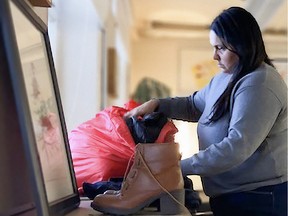Some years ago, when Vanessa Mani first sought help from The Vancouver Sun’s Adopt-A-School campaign, the line between impoverished families needing assistance and those able to manage was well-defined. Read More

Article content
Some years ago, when Vanessa Mani first sought help from The Vancouver Sun’s Adopt-A-School campaign, the line between impoverished families needing assistance and those able to manage was well-defined.
Article content
Article content
Article content
The pre-pandemic families she helped with funds were those living on social assistance or had poor-paying jobs.
Article content
Article content
But not anymore, says Mani, the enhanced services worker at Lord Selkirk Elementary on East 22nd Avenue in Vancouver.
Article content
Advertisement 1
Story continues below
Article content
Article content
Poverty is creeping upwards and now she is seeing some middle-class families looking for support.
Article content
Article content
Article content
“The real crux in this is parents can barely afford to survive just paying rent and when you take into account the exorbitant cost of food, some are really struggling,” Mani explained. “And I’m not talking about (poor) families we talked about in the past. I’m talking about middle-class families who have decent jobs.”
Article content
Article content
It’s her job to care for the welfare of vulnerable children in the school, and a major concern is ensuring they have food at home, clothes, and access to basic necessities for their personal hygiene.
Article content
Article content
Mani said she has been doing that job for so long that she can see the change in the status of families needing help, and it is huge.
Article content
Article content
“We are talking about two (working) parents in a household, and they still can’t afford to provide the basic necessities. So what do they cut first? Food. Now they are not going to buy apples because two cost $5. A mango is $6.
Article content
Advertisement 2
Story continues below
Article content
Article content
“We’re lucky we have a breakfast program here and we supplement it with lots of fresh fruit and vegetables. The thing is, parents know fruit and vegetables are good for their children, but they can’t afford them.”
Article content
Article content
For parents with little food money, a trip to the supermarket is mostly window-shopping — the aisles and fridges packed with food they would like to buy but can’t afford.
Article content
Article content
“I have parents ask me if it would be okay if they just got some microwave popcorn for their kids? It’s heart-breaking,” she continued. “Let me tell you about a family with four children: their parents are working three jobs apiece. Six part-time jobs between them because their rent is so high. They are a refugee family, so fortunately there are grandparents to look after the children while the parents work.
Article content
Article content
“We have refugee families who come here with nothing, absolutely nothing. They don’t have clothes, proper shoes, or coats. I had to take one family from Iran to buy clothes recently with an interpreter because they don’t speak a word of English.